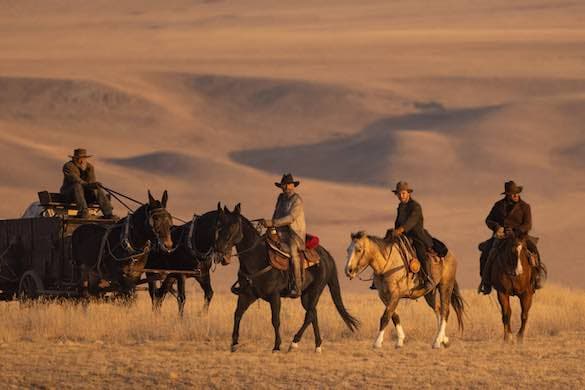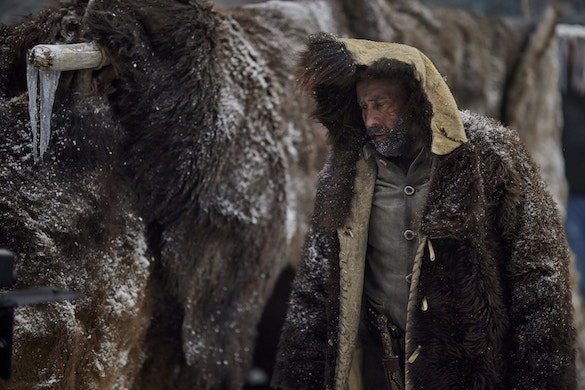Compelling New Western Starring Nicolas Cage, ‘Butcher’s Crossing,’ Is Suffering an Ignoble Fate
The debut film from writer and producer Gabe Polsky merits serious consideration, but finding it in even a Manhattan theater is already proving difficult.

“Butcher’s Crossing,” the debut film from writer and producer Gabe Polsky, snuck into Manhattan last week and was acknowledged by a smattering of lukewarm reviews. One critic complained that it had all the propulsion of a glacier; another thought its star, Nicolas Cage, was miscast. As of this writing, Mr. Polsky’s film is playing somewhere in the recesses of the labyrinthine maze that is AMC Empire 25 on West 42nd Street.
This, I think, is an ignoble fate for a film that merits serious consideration. Admittedly, Mr. Polsky is playing to an audience of rather specialized and not always congruent tastes — that is to say, John Wayne fans with Ph.D.s in Post-Colonial studies. You don’t go about adapting a book by an undersung American novelist, John Williams, and expect “Barbie”-size numbers at the box office.
Neither do you go about making a picture in a genre whose vital signs are perpetually being held in question. The heyday of the cowboy movie — or, as crossword puzzle aficionados know them, “oaters” — occurred during the mid-20th century and was dealt serious blows by the advent of television and, especially, the cultural cynicism borne by the 1960s.
Like most cowboy flicks made after “The Wild Bunch” (1969) — you remember, the world-weary shoot-’em-up starring William Holden, Ernest Borgnine, and Robert Ryan — “Butcher’s Crossing” is a revisionist Western, a movie that doesn’t celebrate the independence of spirit bred by purple mountains majesty, but the excesses committed by men with little moral compass and few constraints on their actions.
The story of “Butcher’s Crossing” is bone simple: a tenderfoot from back East — a student at Harvard, no less — heads out west in the hopes of “expand[ing] my understanding of the world beyond Boston.” The year is around 1870.

Following a lead provided by his father, a Presbyterian minister, Will Andrews (Fred Hechinger) lands in Butcher’s Crossing, Kansas. He runs into Miller (Mr. Cage), a bald and brooding buffalo hunter who is given to straight talk, fair play, and, as we learn all too surely, grandiloquent and life-threatening obsessions.
Miller hires Will to tag along as part of a team for the buffalo hunt to end all buffalo hunts. It helps, of course, that Will is flush with cash. The other two gents tagging along are a bible-thumping drunkard named Charley Hoge (Xander Berkley) and a buffalo skinner par excellence with a big mouth and a bad attitude, Fred Schneider (Jeremy Bobb). Along the way we briefly meet Francine (Rachel Keller), the proverbial whore with a heart of gold.
Although peppered with fleeting moments of psychedelia, “Butcher’s Crossing” is reassuringly true to form, a morality play whose brutality and fatalism don’t preclude kindness or awe. Were such ace directors as Howard Hawks, John Ford, and Anthony Mann still with us, they would recognize the contours of Mr. Polsky’s narrative as being close kin to those found in “Red River” (1948), “The Searchers,” (1956) and “Naked Spur” (1953).
The film also brings to mind Herman Melville’s “Moby Dick” and almost anything by Joseph Conrad. Mr. Cage handles himself well as a kind of Rocky Mountain Captain Ahab, offsetting the mannerism for which he is renowned with welcome understatement. Messrs. Berkley and Bobb invest their one-note characters with requisite intensity, and Mr. Hechinger provides nuance for his portrayal of a naif who has to hit the road running.
Mention should be made of David Gallego’s cinematography — this is a film with a feel for the land that is simultaneously epic in sweep and tragic in its particulars — and, especially, the Blackfeet Nation of Montana. It was under their auspices that the buffalo in the film were handled. Given that many of the scenes involving the animals are violent, rough, and scary — has CGI been employed? It sure doesn’t look like it: Their caretakers deserve kudos in the orchestration. In that regard, a solid entertainment often achieves an almost untenable magnificence. “Butcher’s Crossing” is a keeper.

